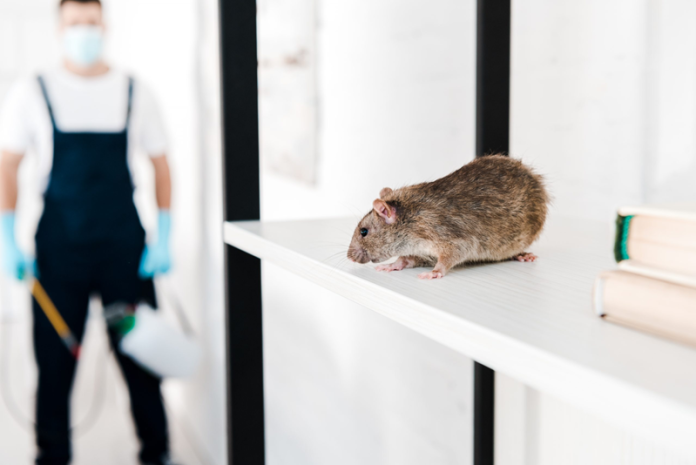Rodents are not just household pests. They also pose health risks to humans. These creatures can transmit diseases, risking serious illness or death. We must understand rodent-borne diseases. This is key for pest control and public health.
This guide will explore common rodent-borne diseases. Symptoms, how they spread, and how to prevent them will be covered.
How Do Rodent Borne Diseases Spread
Rodent-borne diseases spread through various channels. So, we must be careful when interacting with rodents and their environments. Bites or scratches from rodents are the main way to spread some diseases. These illnesses can also spread by contact with surfaces contaminated with rodent waste. Eating food or drinking water with these contaminants can introduce pathogens. This poses serious health risks.
Airborne transmission represents another concerning pathway, particularly with diseases such as hantavirus. This occurs when dust containing dried rodent feces is disrupted and breathed in. It is crucial to understand that these illnesses are not exclusive to rural regions with rodents. Urban environments can also spread rodent-borne illnesses. They allow close quarters between humans and rodents.
Hantavirus
Hantavirus poses a serious threat. Although deer mice are the chief carriers, other rodents can also spread it. Frequently, the virus is transmitted to humans through airborne particles from either rodent waste or saliva. Signs of infection include high body temperature, muscle pain, tiredness, and trouble breathing. In severe situations, it can lead to hantavirus pulmonary syndrome.
Always use protective gloves and a mask when addressing rodent issues. Additionally, ensure adequate ventilation to prevent harmful inhalations. Also, rodent control measures can help reduce hantavirus risk. Seal entry points, remove food, and trap rodents. This will reduce infestations in and around homes. Education on hantavirus risks and hygiene can empower people. Infectious diseases can then be prevented.
Salmonellosis
Rats and mice have the ability to carry and transmit the virus. Salmonella bacteria cause it. Any contact with rats or their excrement might result in the transmission of Salmonella. Additionally, tainted food or water might also carry the virus. Vomiting, diarrhea, nausea, fever, and abdominal pain are symptoms of salmonellosis.
Serious cases of salmonellosis can result in dehydration and additional complications that may necessitate hospitalization. Reduce your chances of getting salmonellosis by maintaining high levels of cleanliness. Avoid contact with rodents. Take precautions when handling food. Use methods to control rodents to prevent infestations and decrease the risk of Salmonella.
Leptospirosis
Infected rodents’ urine can pollute water, soil, or food, leading to human infection. Leptospirosis can impact individuals from minor flu-like symptoms to severe complications. Sore muscles, high body temperature, and headaches are some symptoms. In severe situations, kidneys, liver, and other organs may suffer harm. Leptospirosis, if left untreated, can result in kidney failure and meningitis.
Lymphocytic Choriomeningitis
LCMV is a type of virus. It is frequently transmitted by household mice and other rodents. Contact with rodent urine, droppings, saliva, or nests can lead to humans becoming infected. Avoid rodents and places where they live. Use rodent control to prevent diseases rodents transmit. Close up openings, eliminate sources of food, and place traps. This will protect them and their unborn children from LCMV infection.
Prevent Rodent Borne Diseases
We must use effective strategies to stop rodent-borne diseases. They are vital for health and safety. To prevent these diseases, we must maintain homes and environments. This will deter rodents from entering and nesting. Securely sealing openings and gaps in buildings denies rodents access to living spaces. Sealed containers and a clean kitchen reduce attractants for rodents. Gardens and outdoor spaces must be free of rubbish and overgrown plants. They could shelter rodents.
Using humane traps and getting pest control help can better manage rodents. Everyone can reduce the risk of rodent-borne diseases. To do this, follow these practices: wash hands often and avoid contact with rodents. These measures protect individual health and the community.
The Role of Public Health Initiatives in Controlling Rodent Populations
Public health strategies are key to reducing risks from rodents and their diseases. They include many activities. They aim to educate the community and reduce rodents in urban and rural areas. A key part of these initiatives is educational outreach. It informs the public about rodent-borne diseases, the need to prevent infestations, and effective hygiene practices to reduce risk. Also, government rodent control programs target high-risk areas. They use methods from habitat alteration to traps and baits to curb rodent growth.
Rodents are a major health risk. They carry and spread many diseases. We must know the diseases rodents carry and how they spread. This is essential in stopping their transmission and safeguarding public health. People can lower the chances of contracting diseases carried by rodents. They can achieve this by managing rodents, removing their living spaces, and maintaining good hygiene. They must also promptly seek medical help if they suspect an infection.
These steps will help create safer living environments for themselves and their communities. Public health efforts to control, monitor, and educate about rodents are vital. They prevent outbreaks and reduce the impact of rodent-borne diseases.
In Conclusion
Local authorities, pest control pros, and health departments must work together. Their collaboration is vital to the success of these initiatives. They help to quickly find infested areas, remove rodents, and manage disease outbreaks.
Surveillance systems, another critical component, help monitor rodent populations and diseases. They guide public health responses. They allow for timely adjustments to control strategies based on new data. Public health initiatives help contain rodents and reduce disease. They do this by raising awareness and encouraging action. Their efforts protect health and boost community resilience against rodent-borne diseases.











































